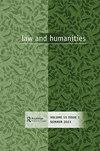“爱与法律一起登上王位”:北爱尔兰公民身份和谢默斯·希尼的《安提戈涅》
IF 0.3
Q3 LAW
引用次数: 0
摘要
在本文中,我通过诗人西莫斯·希尼2004年版的《安提戈涅:底比斯的葬礼》来审视北爱尔兰关于公民身份的争议。北爱尔兰的公民身份和身份——人们是爱尔兰人还是英国人——一直是那里冲突的核心问题。1998年的和平协议承诺,允许人们按照自己的意愿选择自己的身份,而不是被迫接受他们所拒绝的身份。但最近的争议,包括英国脱欧和一项重大的法律挑战,表明公民身份的法律概念无法实现这一承诺。索福克勒斯的《安提戈涅》呈现了国家权威与深刻的个人/道德承诺之间的巨大冲突,以及由此产生的悲剧。希尼的《安提戈涅》揭示了公民身份核心的根本冲突,并为我们指出了一种灵活的、情境化的多层次公民身份,以解决法律对公民必须是什么的僵化概念。本文章由计算机程序翻译,如有差异,请以英文原文为准。
‘Love mounts to the throne with law’: citizenship in Northern Ireland and Seamus Heaney’s Antigone
ABSTRACT In this paper, I examine disputes about citizenship in Northern Ireland though the lens of poet Seamus Heaney’s 2004 version of Antigone, The Burial at Thebes. Citizenship and identity in Northern Ireland – if people are Irish or British – has been a central issue of the conflict there. The 1998 peace agreement promised to allow people to identify however they wished, and not be forced to adopt an identity they rejected. But recent controversies, including Brexit and a major legal challenge, have shown that the legal concept of citizenship has not been able to fulfil this promise. Sophocles’ Antigone presents a great clash between the authority of the State and deep personal/morality commitments, and the tragedy that result. Heaney’s Antigone casts light on the fundamental clash at the centre of citizenship, and points us toward a flexible, contextual multi-level citizenship as a solution to law’s rigid conception of what a citizen must be.
求助全文
通过发布文献求助,成功后即可免费获取论文全文。
去求助
来源期刊

Law and Humanities
LAW-
CiteScore
1.00
自引率
0.00%
发文量
21
期刊介绍:
Law and Humanities is a peer-reviewed journal, providing a forum for scholarly discourse within the arts and humanities around the subject of law. For this purpose, the arts and humanities disciplines are taken to include literature, history (including history of art), philosophy, theology, classics and the whole spectrum of performance and representational arts. The remit of the journal does not extend to consideration of the laws that regulate practical aspects of the arts and humanities (such as the law of intellectual property). Law and Humanities is principally concerned to engage with those aspects of human experience which are not empirically quantifiable or scientifically predictable. Each issue will carry four or five major articles of between 8,000 and 12,000 words each. The journal will also carry shorter papers (up to 4,000 words) sharing good practice in law and humanities education; reports of conferences; reviews of books, exhibitions, plays, concerts and other artistic publications.
 求助内容:
求助内容: 应助结果提醒方式:
应助结果提醒方式:


